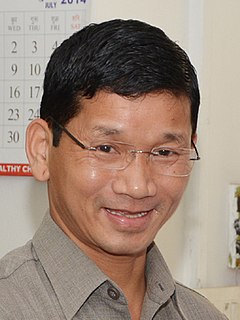Related Research Articles

The Central Bureau of Investigation (CBI) is the premier investigating agency of India. It operates under the jurisdiction of the Ministry of Personnel, Public Grievances and Pensions. Originally set up to investigate bribery and governmental corruption, in 1965 it received expanded jurisdiction to investigate breaches of central laws enforceable by the Government of India, multi-state organised crime, multi-agency or international cases. The agency has been known to investigate several economic crimes, special crimes, cases of corruption and other cases. CBI is exempted from the provisions of the Right to Information Act. CBI is India's officially designated single point of contact for liaison with the Interpol.

Arjun Singh was an Indian politician from the Indian National Congress, who served twice as the Chief Minister of Madhya Pradesh in the 1980s. He also served twice as the Union Minister of Human Resource Development, in the Manmohan Singh and P. V. Narasimha Rao ministries.

Bhupinder Singh Hooda is an Indian National Congress politician who is the current Leader of the Opposition in Haryana Legislative Assembly. He also served as the Chief Minister of Haryana from 2005 to 2014.

Ranchi University is a public state university in Ranchi, Jharkhand, India. It was established in 1960 by an Act of the Bihar legislature. Ranchi University offers degrees in undergraduate, post-graduate, M.Phil. and doctorate programs.

Vikram Verma is an Indian politician and a leader of the Bharatiya Janata Party (BJP) from Dhar, Madhya Pradesh. He formerly served as a Member of Parliament (MP) in the Rajya Sabha. He also served as a Minister in the Government of India for Youth and Sports Affairs from 2002 to 2004.

Gali Janardhana Reddy is an Indian industrialist and politician affiliated with the Bharatiya Janata Party.
Mining scams in India refers to a series of alleged widespread scams in various ore-rich states of India, which has generated controversy. Such issues span encroachment of forest areas, underpayment of government royalties, conflict with tribals regarding land-rights. The spill-over of the effects of legal mining into issues such as Naxalism and the distortion of the Indian political system by mixed politics and mining interests, has gained international attention.
Uttar Pradesh food grain scam took place between years 2002 and 2010, in Uttar Pradesh state in India, wherein food grain worth ₹350 billion (US$4.4 billion), meant to be distributed amongst the poor, through Public Distribution System (PDS) and other welfare schemes like Antyodaya Anna Yojana (AAY), Jawahar Rozgar Yojana and Midday Meal Scheme for Below Poverty Line (BPL) card holders, was diverted to the open market. Some of it was traced to the Nepal and Bangladesh borders, as in 2010 security forces seized Rs 11.7 million worth of foodgrains like paddy and pulses being smuggled to Nepal, another Rs 6062,000 worth of grains were confiscated on the Indo-Bangladesh border.
Uttar Pradesh NRHM Scam is an alleged corruption scandal in the Indian state of Uttar Pradesh, in which top politicians and bureaucrats are alleged to have siphoned off a massive sum estimated at ₹100 billion (US$1.3 billion) from the National Rural Health Mission, a central government program meant to improve health care delivery in rural areas. At least five people are said to have been murdered in an attempt to coverup large-scale irregularities. Several former ministers of then ruling party, Bahujan Samaj Party have been investigated by the Central Bureau of Investigation
Rinku Singh Rahi is an Indian whistleblower and PCS officer fighting against corruption in sponsored welfare schemes in Uttar Pradesh (UP). He was shot six times by local gangsters, damaging his jaw and the vision of one eye, for exposing corruption.

Also referred to as the AgustaWestland VVIP chopper deal, the Indian helicopter bribery scandal by Congress led UPA Government refers to a multimillion-dollar corruption case in India, wherein money was paid to middlemen and Indian officials in 2006 and 2007 to purchase helicopters for high level politicians. As per the CBI, this amounted to ₹2.5 billion (US$31 million), transferred through bank accounts in the UK and UAE.

Kalikho Pul was an Indian politician and former Chief Minister of the north-eastern state of Arunachal Pradesh for a brief time in 2016. He was elected five times from the Hayuliang Vidhan Sabha constituency representing the Indian National Congress. With the support of a few elected members of Congress and the opposing Bharatiya Janata Party, he took Chief Ministership of Arunachal Pradesh. However, the Supreme Court of India ruled against this appointment on various grounds. On 9 August 2016, Pul allegedly committed suicide by hanging at his official residence in Itanagar; Pul's supporters protested in Itanagar demanding an investigation by the Central Bureau of Investigation (CBI).
The Vyapam scam was an entrance examination, admission and recruitment scam. It was functional since the 1990s and was finally unearthed in the Indian state of Madhya Pradesh in 2013.
The Aavin milk scam involved continuous diversion of supply vans from various districts midway on the route to Chennai and diluting with water. Aavin is the co-operative milk society of the state government of Tamil Nadu, India. The scam was found out on 19 August 2014 when police investigated the van from Narayanapuram village that was carrying empty milk cans that left Tiruvannamalai chilling centre bound to Chennai. Following the news, the state minister for milk was stripped of his post, nine Aavin officials were suspended and the chief suspect, Vaidyanathan, was arrested. The initial estimate of the losses have been valued at one per cent of the total ten lakh litres, amounting to ₹23 lakhs a day.
DMAT scam is a ₹ 10,000 crore admission scam, which came fully into the limelight in June 2015 in Madhya Pradesh (India), when the Controller of Dental and Medical Admission Test (DMAT) exam, Yogesh Uprit was arrested. Indore based RTI activist and whistleblower Dr. Anand Rai was the first to complain against the mass irregularities in admissions into the private medical colleges. In 2015, he filed a petition in the Supreme Court of India demanding CBI investigation in the alleged scam. After hearing the plea, the Supreme Court of India said that DMAT scam is worse than the Vyapam scam. Thereafter, notices to Central and State governments were issued and were asked why the CBI probe should not be ordered. On August 13, 2015, CBI told the Supreme Court that the DMAT scam is many times larger than the Vyapam scam. However, due to shortage of manpower resources, it cannot be investigated by the agency. On September 4, 2015, the Supreme Court of India issued a notice to the Madhya Pradesh government and sought the reply from the state.
The Yadav Singh corruption case is an alleged event of corruption in the Indian state of Uttar Pradesh. Yadav Singh was the Engineer-in-Chief of the Noida Authority, Greater Noida Industrial Development Authority (GNIDA) and Yamuna Expressway Industrial Development Authority (YEIDA). Raids conducted by the Income Tax Department in November 2014 at several locations, including his residence in Sector-51 Noida, showed that Singh owned property disproportionate to his known sources of income.

Anand Rai is best known as whistleblower for exposing the Vyapam scam. The Madhya Pradesh Professional Examination Board (MPPEB), also known by its Hindi acronym "Vyapam", is responsible for conducting several examinations that are used to select candidates for educational institutes and government jobs. A nexus of politicians, MPPEB officials and middlemen carried out massive irregularities in these exams, allowing undeserving candidates to be selected.

Provincial Civil Service, often abbreviated to as PCS, is the administrative civil service under Group A state service of the executive branch of the Government of Uttar Pradesh. It is also the feeder service for Indian Administrative Service in the state.
The Uttar Pradesh illegal sand mining scam is a political scandal relating to events that occurred in 2012–2017 during the Samajwadi Party (SP) rule. It is being investigated by the Central Bureau of Investigation (CBI) on the 2016 orders of Allahabad High Court for allowing illegal mining in 7 districts of Uttar Pradesh – Shamli, Hamirpur, Fatehpur, Siddharthnagar, Deoria, Kaushambi and Saharanpur – in violation of rules and ban by the National Green Tribunal. On 5 January 2019, the CBI raided 14 suspects in 14 locations in 7 cities across Uttar Pradesh and Delhi pertaining to this scam, and incriminating evidence was seized.
References
- 1 2 3 4 Multi-crore scholarship scheme scam stares Madhya Pradesh, August 3, 2013, The Times of India.
- ↑ Indore: Absentee Scholarship Scam a huge task for Lokayukta, January 22, 2014, DNA.
- ↑ Scholarship scam: FIR against college, tribal dept officials, August 9, 2014, Hindustan Times.
- ↑ Multi-crore Scholarship Scam, February 11, 2015, Nai Duniya.
- 1 2 Scholarship disbursal fraud unearthed in Madhya Pradesh, January 13, 2013, Business Standard.
- 1 2 18 Madhya Pradesh colleges blacklisted for scholarship scam, July 30, 2014, The Times of India.
- ↑ Lokayukta Starts Investigation in Scholarship Scam, February 28, 2014, Dainik Bhaskar.
- ↑ Jabalpur engineering students protest over scholarship scam, demand CBI probe, August 21, 2014, News18.
- ↑ HC asks CBI can you probe MP scholarship scam, July 18, 2015, Times Of India.